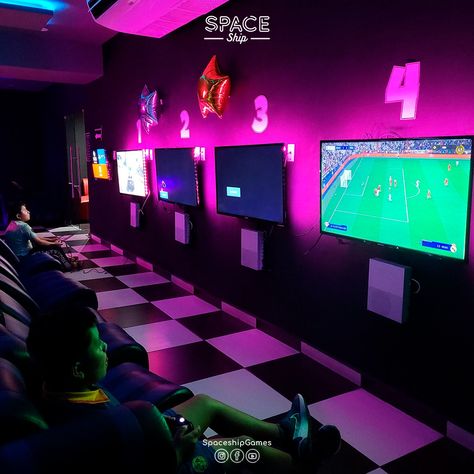
Introduction
Video gaming has become more than just a pastime; it’s a lifestyle, a career, and a thriving community. At the heart of this evolution are video gaming clubs, which serve as hubs for gamers to connect, compete, and grow. These clubs are not just about playing games—they’re about building a culture of camaraderie and skill-sharing. Let’s dive into everything you need to know about video gaming clubs, from their inception to their potential future.
What is a Video Gaming Club?
A video gaming club is a community of gamers who come together to share their passion for video games. These clubs can be physical spaces or virtual communities where players gather to play, discuss, and strategize. Initially, gaming clubs started as informal groups in arcades or at home, but they have evolved into organized entities with formal memberships, dedicated events, and even professional affiliations.

Why Join a Video Gaming Club?
Social Benefits
Gaming clubs are ideal for meeting people who share your interests. Whether you’re into RPGs, FPS games, or strategy games, there’s a club out there for you. These clubs foster friendships and collaborations, making gaming more enjoyable.
Competitive Edge
For those who dream of going pro, gaming clubs offer a gateway to tournaments and competitions. Clubs often organize ranked matches and connect members with industry professionals.
Access to Resources
Gaming clubs often have exclusive perks like advanced gaming setups, high-speed internet, or access to expensive gaming titles. Members also benefit from training workshops and expert advice.

Setting Up a Video Gaming Club
Creating a video gaming club can be an exciting venture, but it requires careful planning and execution. Here’s how to get started:
Step 1: Planning and Organization
The first step in setting up a gaming club is defining its purpose. Is your club for casual gaming, competitive play, or a mix of both? Deciding on a theme helps shape the club’s identity. For example, you might focus on retro games, FPS tournaments, or MOBA training sessions.
You also need to identify your target audience. Are you aiming to attract high school students, college gamers, or working professionals? Knowing your demographic will guide your decisions on activities, equipment, and promotion strategies.
Step 2: Legal and Logistical Considerations
Once you have a clear vision, it’s time to deal with logistics. If you’re setting up a physical club, look for a location that’s easily accessible and spacious enough to accommodate gaming equipment and members. Ensure you have proper licensing for hosting events or offering gaming titles.
For virtual clubs, choosing the right platform (like Discord, Slack, or Steam communities) is crucial. Set clear rules and guidelines to maintain a friendly and inclusive atmosphere.

Step 3: Building a Team
Running a gaming club requires teamwork. Assemble a group of individuals who can take on roles such as:
- Club Administrators: Handle memberships and overall coordination.
- Event Managers: Organize gaming nights, tournaments, and workshops.
- Technical Support: Ensure all equipment and systems run smoothly.
Distributing responsibilities ensures the smooth functioning of the club and prevents burnout among organizers.
Gaming Club Activities
A well-rounded video gaming club offers a variety of activities to cater to its members’ interests. Here are some popular options:

Casual Gaming Nights
Casual gaming nights are the heart and soul of many clubs. These sessions allow members to unwind and enjoy games without the pressure of competition. It’s a great way to bond with fellow gamers and explore new titles together.
Tournaments and Competitions
Competitive events are a must for serious gamers. Hosting tournaments not only attracts skilled players but also boosts the club’s reputation. Consider organizing leagues or knockout-style events for popular games like Valorant, League of Legends, or Call of Duty.
Workshops and Training Sessions
Skill-building sessions can help members improve their gameplay. Invite professional players or coaches to conduct workshops on strategies, team coordination, or even gaming ergonomics.
Streaming Events
Livestreaming events allow your club to connect with a global audience. Whether it’s showcasing a high-stakes match or hosting Q&A sessions with gaming influencers, streaming can elevate your club’s profile.
Popular Games in Gaming Clubs
Gaming clubs cater to diverse interests, and the games they feature often reflect current trends. Here are some popular genres and titles in 2024:
- FPS (First-Person Shooters): Games like CS:GO, Valorant, and Overwatch 2 dominate the competitive scene.
- RPGs (Role-Playing Games): Titles like The Elder Scrolls Online and Final Fantasy XIV attract players who enjoy immersive worlds.
- MOBAs (Multiplayer Online Battle Arenas): League of Legends and Dota 2 remain staples in eSports.
- Sports Games: FIFA 24 and NBA 2K24 are favorites for fans of virtual sports.
By regularly updating your club’s game roster, you can keep members engaged and attract new players.
Essential Equipment for a Gaming Club
Running a successful gaming club requires the right setup. Here’s what you need:

Hardware
- PCs and Consoles: High-performance systems capable of running the latest games smoothly.
- Peripherals: Gaming keyboards, mice, headsets, and controllers enhance the experience.
- Displays: Monitors with high refresh rates for competitive gaming.
Software
- Games: Invest in licenses for popular titles.
- Streaming Tools: Use software like OBS Studio for broadcasting events.
- Communication Platforms: Tools like Discord are essential for coordination.
Space Setup
- Ergonomic chairs and desks are a must for long gaming sessions.
- Good lighting and soundproofing enhance the gaming environment.
Promoting Your Video Gaming Club
Effective promotion can make or break a gaming club. Use these strategies to attract members and build a strong community:
Leverage Social Media
Platforms like Instagram, Twitter, and TikTok are excellent for showcasing your club’s activities. Share highlights from events, member testimonials, and gaming tips to engage your audience.
Collaborate with Sponsors
Partnering with gaming brands or local businesses can provide financial support and enhance your club’s credibility. Sponsors might offer equipment discounts, prizes for tournaments, or promotional opportunities.
Host Community Events
Open events like “game-and-meet” sessions can introduce potential members to your club. Make these events fun and welcoming to encourage sign-ups.

Membership Options
A successful video gaming club thrives on its members, and offering flexible membership options can attract a diverse audience. Here’s how you can structure membership plans:
Free Membership
Free memberships are ideal for beginners or casual gamers who want to explore the club. While these members may not have access to premium perks, they can still participate in basic activities like casual gaming nights or introductory workshops. This option serves as a great way to bring in newcomers and encourage them to upgrade later.
Paid Membership
Paid memberships unlock a range of benefits, such as:
- Priority access to gaming equipment
- Discounts on tournaments and events
- Invitations to exclusive workshops or beta testing sessions
- Personalized coaching or mentoring sessions
Offering tiered plans, such as basic, premium, and VIP memberships, can further cater to varying levels of interest and affordability.
Trial Periods and Promotions
Consider offering trial memberships or discounted rates during special promotions to entice potential members. Seasonal events like gaming expos or holidays are excellent opportunities to roll out such offers.
Revenue Streams for Gaming Clubs
Sustaining a gaming club requires steady income. Here are some popular ways to generate revenue:

Sponsorships and Partnerships
Collaborate with gaming brands, tech companies, or local businesses. These partnerships can fund events, provide equipment, or even promote your club in exchange for brand visibility.
Membership Fees
As mentioned earlier, paid memberships can serve as a consistent income stream. Clearly outline the perks to justify the pricing and attract more members.
Hosting Paid Events
Organize tournaments, LAN parties, or gaming expos with entry fees. High-profile events can also attract sponsorships and media coverage.
Merchandise and Branding
Selling branded merchandise like T-shirts, hoodies, or mousepads can help generate additional income while promoting your club’s identity.
Challenges Faced by Gaming Clubs
Running a gaming club is not without its hurdles. Here’s how to address some common challenges:

Financial Sustainability
Maintaining a steady income can be tricky, especially in the initial stages. Diversifying revenue streams and keeping operational costs low can help overcome this.
Maintaining Member Engagement
Keeping members active and involved requires consistent effort. Regularly update your events calendar and seek member feedback to ensure you’re meeting their expectations.
Technical Issues
From server crashes to equipment malfunctions, technical problems can disrupt activities. Having a dedicated technical team and backup plans in place can mitigate these risks.
Future of Video Gaming Clubs
As gaming technology evolves, so does the potential for video gaming clubs. Here are some trends to watch out for:

Integration of VR and AR
Virtual and augmented reality are revolutionizing gaming experiences. Clubs that invest in VR/AR setups can offer cutting-edge experiences that attract tech-savvy gamers.
Rise of eSports
The eSports industry is booming, and gaming clubs play a crucial role in nurturing talent. Partnering with eSports organizations or hosting qualifier matches for major tournaments can place your club on the map.
Inclusivity in Gaming
The future of gaming clubs lies in welcoming diverse audiences, including female gamers, LGBTQ+ communities, and players with disabilities. Creating an inclusive environment broadens your club’s appeal and strengthens its community.
Conclusion
Video gaming clubs are more than just spaces for playing games—they’re communities that bring people together, foster talent, and shape the future of gaming. Whether you’re looking to join a club or start your own, understanding their dynamics can help you make the most of this exciting trend. With the right setup, activities, and promotion strategies, gaming clubs can create memorable experiences for all their members.
FAQs
- How do I join a gaming club near me?
Search online for gaming communities in your area or on platforms like Discord and Facebook. Many clubs have public groups where you can inquire about memberships. - Are gaming clubs suitable for beginners?
Absolutely! Most clubs welcome players of all skill levels and offer training sessions to help beginners improve. - What are the costs associated with joining a gaming club?
Costs vary based on the club’s offerings. Free memberships are common, but paid options typically range from $10 to $50 per month, depending on perks. - How can a gaming club contribute to professional gaming?
Clubs often serve as stepping stones for aspiring eSports players by providing access to tournaments, coaching, and industry networking. - What is the future of gaming clubs?
Gaming clubs are poised to integrate new technologies like VR/AR and expand inclusivity, making them central to the gaming community’s evolution.

